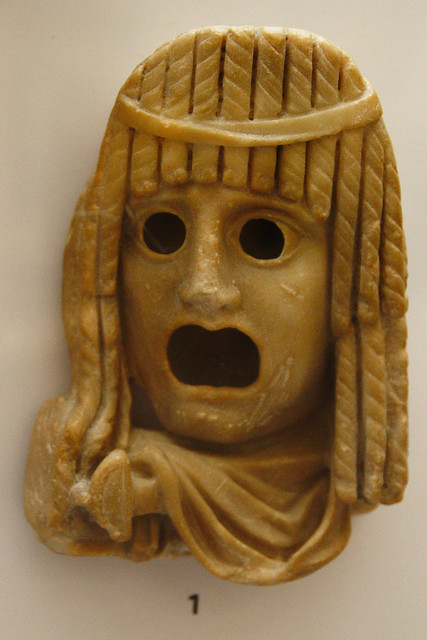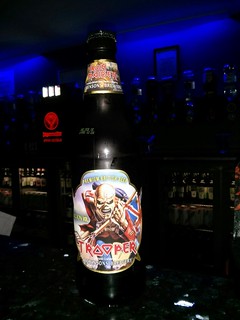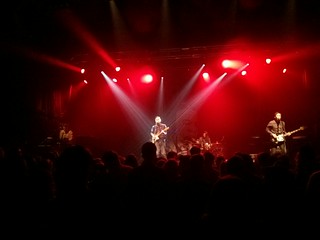Border Country can be fairly characterised as unashamed propaganda for the No-to-Independence side of the upcoming referendum in Scotland. To be fair that fits my own bias* so I was predisposed to like the series. The narrative structure for the two programmes was a history of the border regions of England and Scotland from the time of the Romans through to James VI & I as ruler of both countries. It was presented by Rory Stewart, and his thesis is that the border between Scotland and England is not a natural cultural breakpoint, but more of an arbitrary line drawn across the region. And he believes that these sorts of line-on-the-map borders lead to more problems than they solve.
*One selfish reason: if Scotland isn’t part of Britain then as the English born child of Scottish parents I lose my sense of national identity (I’m British rather than Scottish or English). One more political reason: As someone who can’t vote in the referendum I’m not looking into it closely, but the rhetoric in favour of independence that I do see is heavy on the “of course the bad stuff stays with the UK but we’ll get to keep the good bits of the Union even once we’ve left”. And that feels naive and foolish to me – maybe everything will work out the way they want, but unless there are some signed agreements then making contingency plans on worst case scenarios and reassuring your public about them would seem sensible.
The intros from the BBC continuity announcer for both programmes were very pointed about this being Stewart’s personal opinions, and he says that himself several times through the series. Part of this is distancing it from his job – he’s the Conservative MP for the Penrith and the Border consituency in Cumbria. So important for him to point out repeatedly this is him speaking for himself and not the Tories in general. But this also came up several times when he was talking about the history of the region – he’d fairly often say something along the lines of “many historians believe X but I believe Y because …”.
The facts and stories that he told us were mostly the same as in many other programmes about British history. But there were two major differences in the way the narrative was framed that made this a series worth watching. The first of these was that it was strongly focused on the stretch of land between the river Humber and the river Forth, which he referred to throughout as the Middleland. He emphasised the continuity of culture across that region, both before and after the Romans built Hadrian’s Wall. The first programme covered the tribal culture of the people who lived in the region before the Romans, then the effect the Wall had on them. This was followed by the aftermath of the demilitarisation of that border when the Roman Empire shrank back away from Britain. And that programme ended on a high note with the golden age of Northumbria – the era of the Venerable Bede and St Cuthbert. A time when this region was a centre for religious thought and art across Europe – note that Northumbria at the time covered areas on both sides of the border. The second programme was full of death and destruction. He concentrated on the Vikings, then the Harrowing of the North by William the Conqueror and finally the Anglo-Scottish wars of the late medieval period and the clans of Reivers who terrorised the area during this period. The power of these clans, in Stewart’s narrative, was broken only when the border ceased to divide the countries. He said that the unification of Scotland and England into the United Kingdom meant that the Reivers weren’t useful to the military of one side or the other so it was easier to enforce the law in the region.
The other way in which the framing of this series was different to many other British history programmes is that Stewart frequently drew parallels between our history and areas of the world today. He was a deputy governor in Iraq for a while, he’s got a lot of involvement in charity work in Afghanistan and has walked through that country and written a book about it. As well as other places. So, for instance, he was comparing the tribal Celtic culture that existed before the Romans arrived to rural Afghanistan. He compared the golden age of Northumbria to modern day Tibet – because of the monkish religious cast to the culture. Never in a “it’s exactly the same” sort of way, but in a way that drew out the parallels and made you think about both the history of Britain and the current state of the world in a new way.
I don’t think I always agreed with him – I could see places where I thought he’d had to be careful to pick his facts to fit his story (like the Edward I trying to conquer Scotland bit didn’t quite sit right with me, for instance). And I think the implied “don’t vote for independence because it’ll all go up in smoke” is a bit too far-fetched. But equally, I do agree that the boundary between Scotland and England is a historical artifact – drawn by the Romans for their own imperial reasons. And it was thought provoking, and good to look at the history I know through a different lens.
Rococo: Travel Pleasure Madness was a three part series about the Rococo art movement presented by Waldemar Januszczak. It’s a sequel of sorts to the series he did last year about Baroque art that we watched in February (post). In the Baroque one he moved across the continent following the movement, this Rococo series was done in three themes instead. And his themes were picked to support his thesis that a lot of the modern world has its roots in the Rococo. First he looked at the period and the art in terms of travel – particular emphasis on Venice as a tourist destination, as well as the fondness for paintings of exotic animals and Chinoiserie. Next was pleasure, and there were two strands to this. One was the sort of decadent pleasure epitomised in Boucher’s Blonde Odalisque (a painting I’ll never look at in quite the same way after seeing Januszczak sprawl across a sofa in the same pose (with his clothes on, thankfully!)) and in Marie Antoinette pretending to be a milkmaid. The other strand talked about things like how “the pursuit of happiness” as a human right is a Rococo idea. The last of the themes was madness – a lot of the Rococo style is rather otherworldly and unreal, and this programme focussed on where that could lead and the darker side of the Rococo.
As with the Baroque series it’s hard to find things to say, because it’s all about the visuals. One thing that does strike me is that Januszczak’s programmes have a distinctive style to them. I’m not sure I can articulate it, it’s more of a feeling than something I’ve got figured out – but I’m hard pushed to think of another presenter who spends so much time walking away from the camera with his back to the audience. Another quirk is that often he has people looking at the paintings he’s talking to – and they’re not just people around in the art gallery by chance, it’s always the same handful of people so it’s for deliberate effect. This series also had people dressed up and acting out silent vignettes completely ignoring him while he stood and explained what was going on.
I still think Rococo art is overall a bit too frilly and a bit too pink, but I do now know more about what’s there behind the pink frilliness!
When Albums Ruled the World – nostalgia for the heyday of the vinyl LP, the 60s & 70s.
Episode 3 of Pagans & Pilgrims – series about the sacred places of Britain, presented by Ifor ap Glyn.
Animals Overnight: Sleepover at the Zoo – programme about sleep and animal sleep patterns. They set up cameras around Bristol Zoo to record what various of the animals did overnight when no-one was around, and also visited various sleep scientists to talk about what we know and don’t know about sleep. Most surprising fact for me is that REM sleep appears to be the result of convergent evolution, even if we still don’t know what its purpose is.
Episode 1 of The Plantagenets – Robert Bartlett covers the history of the Plantagenet dynasty, who ruled England for nearly 300 years.
Episode 5 of The First World War – a 10 part series covering the whole of the war.



